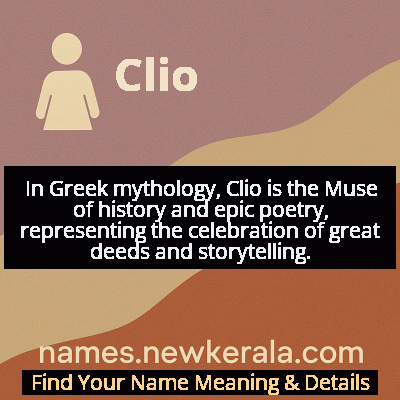Clio Name Meaning & Details
Origin, Popularity, Numerology Analysis & Name Meaning of Clio
Discover the origin, meaning, and cultural significance of the name CLIO. Delve into its historical roots and explore the lasting impact it has had on communities and traditions.
Name
Clio
Gender
Female
Origin
Greek
Lucky Number
3
Meaning of the Name - Clio
In Greek mythology, Clio is the Muse of history and epic poetry, representing the celebration of great deeds and storytelling.
Clio - Complete Numerology Analysis
Your Numerology Number
Based on Pythagorean Numerology System
Ruling Planet
Jupiter
Positive Nature
Optimistic, inspirational, and creative.
Negative Traits
Scattered, exaggerating.
Lucky Colours
Yellow, gold, purple.
Lucky Days
Thursday.
Lucky Stones
Yellow sapphire.
Harmony Numbers
1, 2, 9.
Best Suited Professions
Arts, writing, communication.
What People Like About You
Creativity, optimism.
Famous People Named Clio
Clio
Greek Muse
Muse of history and lyre playing, inspiring historians and chroniclers
Clio Gould
Violinist and Conductor
Renowned Scottish violinist and artistic director of the Scottish Ensemble
Clio Barnard
Film Director
Award-winning British director known for 'The Arbor' and 'The Selfish Giant'
Clio Frenette
Artist and Educator
American painter and professor known for abstract works in major collections
Name Variations & International Equivalents
Click on blue names to explore their detailed meanings. Gray names with will be available soon.
Cultural & Historical Significance
In the Renaissance, Clio experienced a dramatic revival as European scholars rediscovered classical learning. She became a favorite subject in art, appearing in works by masters like Raphael and Poussin, often depicted with her attributes of scrolls and books. The 19th century saw her name adopted for literary journals and historical publications, cementing her association with scholarly pursuit. Today, her legacy continues through the prestigious Clio Awards in advertising and the Renault Clio automobile, demonstrating how ancient mythological figures can maintain relevance in contemporary commercial and cultural contexts.
Extended Personality Analysis
Those named Clio often embody a unique combination of creativity and intellectual rigor, reflecting their namesake's dual domains of musical inspiration and historical accuracy. They tend to be natural storytellers with excellent memory retention and a gift for making connections between seemingly unrelated concepts. Clios often demonstrate what psychologists call 'historical thinking'—the ability to understand events in context and recognize patterns across time. Their celebratory nature makes them excellent at marking important occasions and creating meaningful rituals, while their historical consciousness gives them perspective on current events.
In social settings, Clios are typically articulate and engaging conversationalists who can discuss both abstract ideas and concrete details with equal facility. They often serve as the 'family historian' or 'group archivist,' naturally preserving photographs, stories, and traditions. While they appreciate innovation, they also value continuity and often seek to understand how new developments fit into broader historical patterns. This balanced perspective makes them particularly effective in fields like education, journalism, museum work, or any profession that requires both creative thinking and careful documentation.
Modern Usage & Popularity
In contemporary naming practices, Clio represents a sophisticated choice that bridges classical education with modern sensibility. While it remains relatively uncommon, its usage has steadily increased over the past two decades, particularly among parents with backgrounds in humanities, academia, or the arts. The name enjoys stronger popularity in Europe, especially in France where it ranked within the top 200 names in recent years. In the United States, it remains a distinctive choice, typically given to about 100-150 girls annually. Modern parents are drawn to Clio for its mythological roots, elegant sound, and intellectual connotations without being overtly academic. The name's appeal has been bolstered by celebrity usage, including being chosen by actor Jason Lee for his daughter. Current naming trends favoring mythological and historical figures suggest that Clio may continue to gain popularity while maintaining its distinctive character.
Symbolic & Spiritual Meanings
Symbolically, Clio transcends her mythological origins to represent fundamental human concerns with memory, legacy, and the meaning we derive from our shared past. She embodies the concept that celebration is not merely about momentary joy but about creating something worthy of remembrance. As the Muse who records great deeds, she symbolizes the human desire for immortality through achievement and the transmission of cultural values across generations. In psychological terms, she represents the 'collective unconscious' and how societies process and preserve their experiences. Metaphorically, Clio serves as a reminder that our present actions become tomorrow's history, encouraging thoughtful consideration of how we want to be remembered. She also represents the intersection of objective fact and subjective interpretation—the way historical events are filtered through individual and cultural perspectives. In an age of digital information overload, Clio's symbolism takes on new relevance as we grapple with how to preserve what truly matters from the constant stream of contemporary events.

